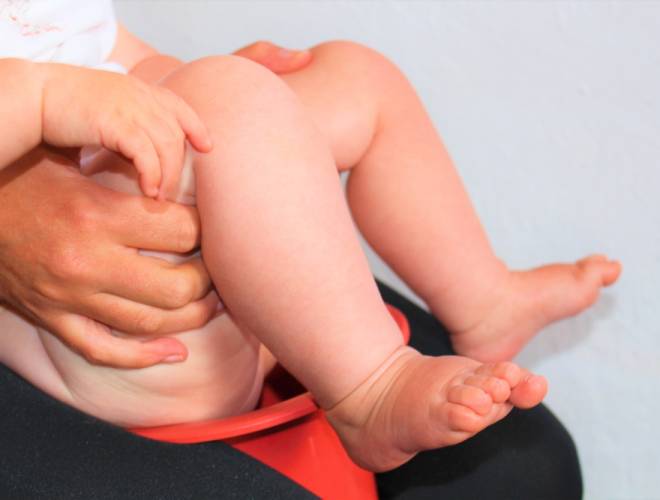
Elimination Communication
For many years it has been the commonly accepted ‘wisdom’ that babies wear nappies – either cloth or disposable – until sometime around the age or two or three. But what if that isn’t really necessary? What if, by using Elimination Communication, you can successfully ‘train’ your baby to use a potty (or any other receptacle you like) from birth?
A Little History
The history of nappies differs around the world. In colder climates, babies began to be wrapped in cloths sometime in the 1500s. These cloths were only changed every few days, and never washed, just scrapped off, dried, and used again. Thankfully, by the 1800’s squares of linen or flannel were being used, and were regularly washed.
However, in Asia, Africa and many warmer climates, babies were left naked and their parents anticipated their elimination schedule. In other words, they practiced Elimination Communication.
What is Elimination Communication
Essentially, Elimination Communication, or EC, is exactly what it sounds like. Learning to correctly interpret your baby’s communication of their need to eliminate or empty their bowel or bladder, and providing an alternative to soiling a cloth or disposable nappy.
When Should I Start?
Most proponents of EC agree the best time to start is at birth. Which, when you think about it, makes sense.
When we put a nappy on a baby, we are training them that this is the place for them to eliminate. But if we start with the idea that elimination should take place somewhere else, we eliminate – excuse the pun – the need to ‘retrain’ at a later date.
Of course, if you didn’t start at birth, that doesn’t mean you can’t try it. The process just might take a little longer.
How To Practice Elimination Communication
There are a few simple steps to take to get started.
Observation
There are two aspects to observing your baby’s elimination habits:
- Timing. How long after they wake do they eliminate? How long after feeding? How often do they eliminate, and at what intervals?
- Signals. Your baby will usually have a ‘tell’ that signals they need to, or are about to eliminate. This might be fidgeting and flailing, going still, grunting and straining (when needing to do a poo), squirming, fussing and unlatching during feeding.
Once you have observed your baby for a few hours, you will begin to notice a pattern. Keep a note of them. While these patterns will change over time, they will give you an indication of when baby is likely to eliminate, and you can be prepared.
Cues
When you notice baby give signals they are about to eliminate, or begin doing so, you make a noise. This might be a hissing noise for urinating and a humming noise for bowel movements. It doesn’t really matter what sound you use, as long as it is consistent and not used for any other purpose. Baby will very quickly begin to associate that noise with opening their bladder or bowel. This will allow you to help baby eliminate at optimal times, like before a bath, before bed, prior to being put in the car or pram.
Preparation
Particularly in the early stages it’s good to have a potty (or whatever you choose for baby to eliminate in) in each room so you can catch the results quickly.
Clothing
Choose clothes that are easy to remove so you act quickly. Nightgowns are a great option, even for boys, or soft leggings you can whip off easily.
Time
Whether you choose to practice Elimination Communication full time or part time is up to you. Many parents choose to use nappies at night, or when they are out, and only practice EC when they are home during the day. There is no right or wrong, just whatever works for you and your baby.
Progress
Every baby is different, and how quickly you are able to train your baby – and yourself – to know or correctly interpret when they are going to soil will differ for each baby. Of course, the more time you spend on it, the faster you should see results. But many parents find their baby can be essentially nappy-free by six months.
Advantages
- It encourages a close connection between you and baby
- You will save money and the environment through reduced use of either cloth or disposable nappies
- It is cleaner
- Baby will be more comfortable not being in a damp or soiled nappy
Disadvantages
- It can be time consuming, particularly in the early stages
- It can be messy until you and baby get the hang of it
- Others may judge your parenting choices
Does it REALLY Work?
If you think this sounds too good to be true, I can say I recently had a client who practiced EC with their newborn baby, and yes, it really does work!
If you would like more information about Elimination Communication or any aspect of pregnancy, labour, childbirth and post-partum, I would love to chat with you. Please give me a call on 0422 258 771 or contact me here.